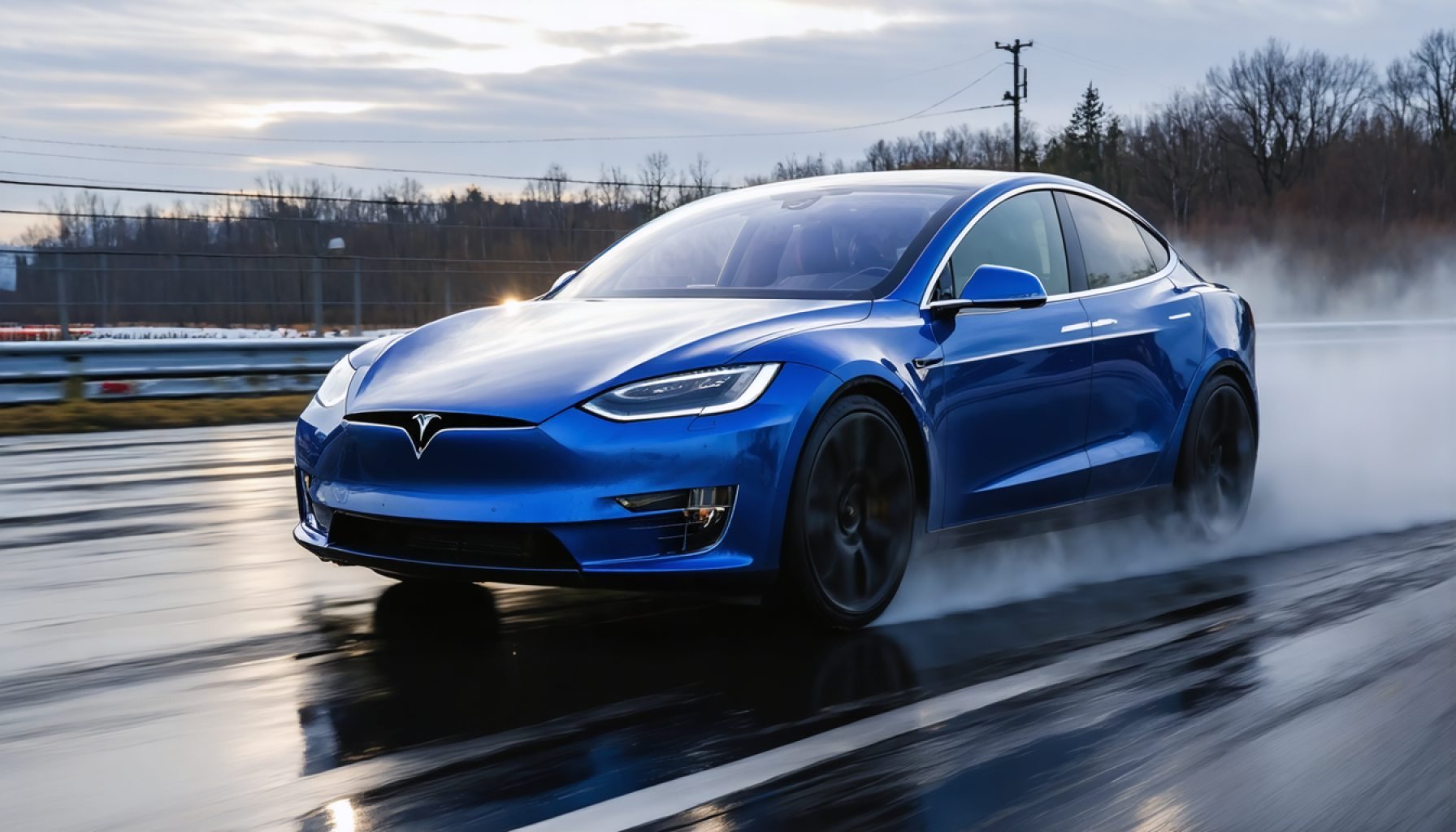- Tesla’s stock dropped 4% as part of a broader market downturn, with the Dow losing nearly 700 points and the Nasdaq down over 1.6%.
- Consumer confidence is shaken, with Walmart reporting reduced spending and a University of Michigan report noting a 10% dip in consumer sentiment in January due to inflation concerns.
- Tesla announced a recall of over 375,000 vehicles due to steering issues, offering a free software fix but highlighting the risks associated with high-profile stocks.
- While some analysts remain optimistic about Tesla’s growth, others point to slowing sales in China and Europe as signs of potential challenges.
- The situation underscores the volatility and risk associated with investing in highly valued stocks amid broader economic uncertainty.
Tesla, with its trailblazing image, finds itself veering off course—a perilous journey marked by consumer unease and unavoidable recalls. As the clock ticked past midday, Tesla’s shares tumbled 4%, mirroring the broader market downturn. The Dow plummeted by nearly 700 points, while the tech-heavy Nasdaq slipped over 1.6%.
At the heart of this financial unease is the trembling confidence of everyday shoppers. Walmart sent ripples through Wall Street earlier this week with news that consumers might be tightening their belts more than anticipated. A sobering report from the University of Michigan further intensified these jitters, with consumer sentiment tanking 10% in January. This steep drop casts a long shadow—suggesting that Americans foresee inflation rising to its highest since the mid-’90s.
Amidst this backdrop of economic tension, Tesla adds fuel to the fire with a massive recall. Over 375,000 vehicles are summoned back to the garage due to steering issues. While the electric giant swiftly launched a free software tweak, the recall embodies the tangible risks underpinning high-flying stocks.
For every bright-eyed investor pinning hopes on Tesla’s next big launch, others point warily at looming roadblocks. While some analysts maintain an optimistic outlook, envisioning Tesla’s resilience and potential growth, skeptics spotlight slowing sales from China to Europe as signs of impending trouble.
In this volatile landscape, one caution remains clear: richly priced stocks, regardless of their past triumphs, may stumble if the ground beneath them feels unsure. As uncertainty dances on the horizon, many are left wondering if Tesla’s latest recall is just a bump or an omen of a larger detour ahead.
Tesla’s Road to Recovery: Navigating Recalls and Market Volatility
Overview of Tesla’s Current Challenges
Tesla, a leader in the electric vehicle (EV) industry, finds itself navigating turbulent waters. A sharp market downturn, massive vehicle recalls, and shifting consumer sentiment have investors questioning the future stability and growth of the company. Understanding these dynamics is crucial for stakeholders and consumers alike.
How-To Steps & Life Hacks for Tesla Owners
1. Managing Recalls Efficiently:
– Check VIN for Recalls: Tesla owners can easily check if their vehicle is affected by visiting the official Tesla website and entering their Vehicle Identification Number (VIN).
– Schedule Service: Use the Tesla app or website to schedule a service appointment. The process is streamlined for convenience.
2. Optimize Battery Life:
– Avoid frequent fast charging unless necessary.
– Maintain a charge between 20% and 80% for daily use.
Real-World Use Cases of Tesla Vehicles
Tesla vehicles are used daily for various purposes beyond just commuting.
– Autonomous Ride-Sharing: Some Tesla owners rent out their vehicles for autonomous ride-sharing when not in personal use.
– Sustainable Transport: Corporate fleets are increasingly opting for Tesla models to reduce carbon footprints.
Market Forecasts & Industry Trends
Despite current challenges, Tesla remains a formidable force in the EV market.
– EV Market Growth: According to Allied Market Research, the global EV market is expected to reach $802.81 billion by 2027.
– Autonomous Vehicles: Tesla’s focus on full self-driving technology positions it advantageously in the fast-evolving autonomous vehicle sector.
Reviews & Comparisons
Tesla vehicles often lead the pack compared to rivals for their range and performance. However, the competition from brands like Rivian, Lucid Motors, and traditional automakers is intensifying.
Controversies & Limitations
Several ongoing controversies affect Tesla’s public perception:
– Safety Concerns: Recent recalls about steering issues highlight safety challenges.
– Labor Practices: Criticisms of workplace culture and unionization conflicts continue to surface.
Features, Specs & Pricing
– Model 3: Starts at around $40,000, offering up to 358 miles of range.
– Model S: Luxurious variant starting at approximately $89,000 with a range of up to 405 miles.
Security & Sustainability
Tesla sets a benchmark in sustainability through eco-friendly manufacturing processes. The gigafactory is a prime example of minimizing environmental impact.
Insights & Predictions
Analysts suggest Tesla might face short-term setbacks but stress its long-term potential remains viable. Innovations in AI and autonomous driving will be crucial growth levers.
Pros & Cons Overview
Pros:
– Market leader in innovation.
– Strong brand loyalty.
Cons:
– High dependency on regulatory incentives.
– Vulnerable to supply chain fluctuations.
Actionable Recommendations
For stakeholders and consumers looking for immediate impact:
– Investors: Diversify portfolios to manage volatility.
– Owners: Stay updated with software upgrades via the Tesla app.
For the latest updates on Tesla, visit Tesla’s official website.
By employing these insights and strategies, Tesla owners and investors can make informed decisions navigating the company’s challenging yet promising landscape.




















